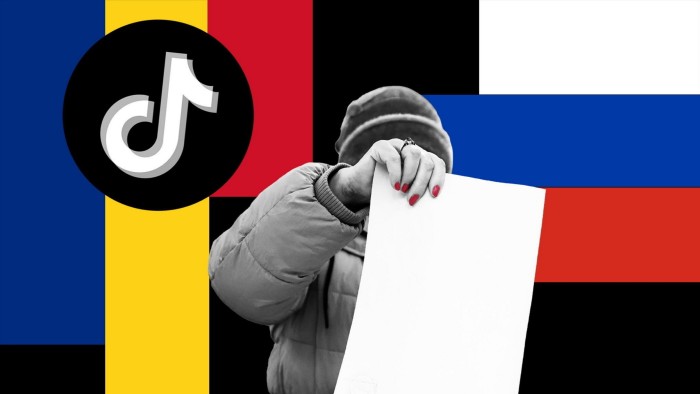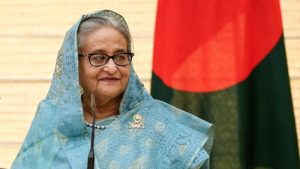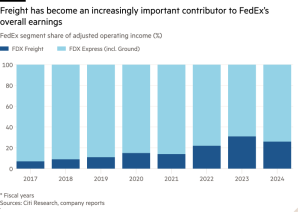How Russia-backed influencers meddled in Romania’s vote

The Russian-backed influence campaign that prompted Romania to scrap its presidential election result echoes operations carried out in Moldova and other countries this year, according to Romanian intelligence reports and Moldovan officials.
Romania’s constitutional court took the unprecedented decision last week to annul Călin Georgescu’s first-round victory. Declassified documents from the interior ministry, and the domestic and foreign intelligence services said the far-right candidate had “illegally benefited” from a “sophisticated” and “massive” social media campaign backed by Russia.
Similar methods were deployed for Moldova’s election in October, with officials in Chișinău estimating that Moscow could have spent up to $100mn this year on seeking to sway voters against EU membership and in favour of a pro-Russian presidential candidate. They warned that the methods used were likely to be replicated in other democracies.
German intelligence has already warned of possible Russian interference in its parliamentary vote in February.
In Romania, Georgescu, a previously little-known ultranationalist who has expressed admiration for Russian President Vladimir Putin and rails against Nato and the EU, secured 23 per cent of the vote in late November despite having polled in the single digits for most of the campaign.

According to the Romanian interior ministry’s declassified note, a network of more than 100 paid influencers with a total of 8mn followers were deployed to boost Georgescu on TikTok and other social media platforms. In the two weeks before the vote, Georgescu shot to ninth place in TikTok’s trending topics worldwide.
The interior ministry said “part of the opening text” used by influencers to promote Georgescu was identical to that used on posts backing pro-Russian candidate Alexandr Stoianoglo in Moldova’s vote.
The Romanian domestic intelligence service, SRI, said Georgescu’s social media campaign had been “co-ordinated by a state actor” with the help of a “very good digital marketing firm”. It said that some 25,000 TikTok accounts “became very active two weeks prior to the election”, some 800 of which had been largely dormant since 2016 when they were first created.
Romanian authorities on Saturday raided the home of Bogdan Peșchir, a 36-year-old coder, who had been singled out by the SRI as having “funded” the promotion of Georgescu on social media.
According to SRI, Peșchir “made donations on TikTok of over €1mn” to unspecified accounts and paid influencers $381,000 in the month before the election to promote Georgescu. Georgescu declared that he had spent zero funds on his campaign.
Peșchir, from the central city of Brașov, is being investigated for money laundering and illegal campaign financing, prosecutors said. Investigators also found $7mn worth of cryptocurrency assets in Peșchir’s name, according to local media.
Peșchir could not be reached for comment. He described the allegations as “false” in a Facebook post, adding that he was not required to publicly disclose his income.

Similar allegations were made in the run-up to the European parliament election in June, when pro-Moscow Ukrainian oligarch Viktor Medvedchuk was accused of running a scheme via a Czech Republic-based outlet, Voice of Europe, that was paying politicians to peddle Kremlin propaganda.
Moldovan officials told the Financial Times that election interference was no longer as simple as handing out cash in envelopes on election day, with campaigns conducted on social media and payments to influencers made in cryptocurrencies making traditional monitoring methods such as election observers and party financing rules “outdated”.
“There is no isolated solution to digitally enabled electoral interference,” said Stanislav Secrieru, adviser on national security to Moldovan President Maia Sandu. “Interference now moves at lightning speed, circumventing laws before they take effect.”
Moscow has ridiculed any suggestion of being behind such influence operations. “The Russian side has not been involved in the electoral processes in Romania. In general, we do not have the habit of meddling in the elections of other countries,” Kremlin spokesperson Dmitry Peskov said last month.
TikTok said it fully complied with national and EU law and that it had taken down the accounts flagged by Romanian authorities.
But the declassified documents point out that videos not flagged as political ads were being posted on other accounts even on polling day, which is illegal under Romanian law.
Georgescu has denied having any links to Russia, saying that the only relationship he has is “with the Romanian people and with God”. He has pledged to take legal action against the constitutional court’s decision and held protests in front of closed polling stations on Sunday, the day the run-off vote should have been held.

Some influencers have admitted to being duped into promoting Georgescu.
Alex Stremiteanu, who has more than 50,000 followers on TikTok, admitted in a post that it was “stupid” to take part in a paid campaign that was presented as an effort to get people out to vote. He said the hashtags he was told to use, including “presidential elections 2024”, were attracting “bots” to the comments section where they would post links redirecting viewers to Georgescu’s content.
“I’m sorry I was used like a dog in this campaign, without knowing what I was doing,” said Stremiteanu.
Other influencers who were named in an annex compiled by SRI denied taking any money and said they were backing Georgescu out of conviction.
Călin Donca, who has more than 600,000 TikTok followers, said in a post that he stood by Georgescu even though he felt unfairly targeted and placed under surveillance. “I promoted change — I don’t know if for better or worse, but it would have been a change I and many Romanians are waiting for.”
#Russiabacked #influencers #meddled #Romanias #vote







